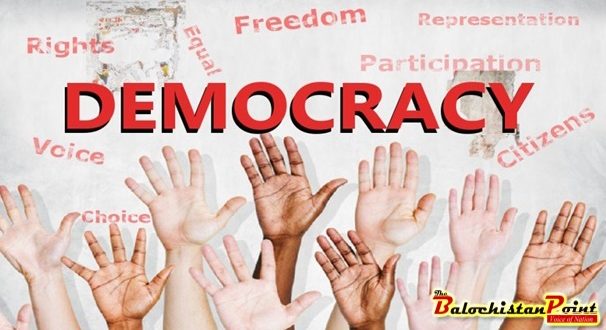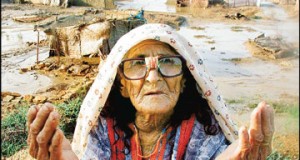By: Suhail Khan Mandokhel
Democracy is not a universal fix. Political scientists have no any objection to this introductory statement. People in different countries can be found happier under authoritarians than they are under democrats. Most relevant example in explaining this paranormal fact is Rwanda, an African country, where economic structure beset with problems under democracy is now moving ahead with strides under dictator Kagame. Reason is far clearer. Democracy promises more than it delivers.
However, it is totally inapt to assert that democracy is failure everywhere. The present stable world order is after all the progeny of democracy. Freedom of people is rather inviolate under democracies and therefore, masses feel emboldened in examining the policies of state that invariably leads to more and more rectification. Against these opening sentences, the case of democracy in Pakistan can easily be elaborated.
Unlike the true democracies of Europe and America, the path to democracy in Pakistan is messy non-linear. Instead of following the straightforward authoritarianism-liberalisation-transition-consolidation pattern, Democracy in Pakistan is moving wrongly. Punctuated and chequered accounts of democracy have been preventing the piecemeal growth of institutes. The inherited democratic version of Great Britain was not let to consolidate. Consequently, institutes are becoming extractive rather than inclusive. This incompatibility of Pakistan with democracy can be ascribed to a many factors.
It is reasonable to write that democracy can delivered amongst people who are characterized by tolerance, diversity, accommodation and compromise. Very Unluckily, People in Pakistan lack these subjective features. These characteristics, however, are not indispensable. Jeff Haynes asserts in his book ‘Democracy and political change in the third world’, “It is not necessary to have a certain set of cultural norms present before democratic practices and institutions can emerge and develop”. Based on this scholarly opinion, the societal qualities can’t be called as imperatives but aiding legacies to the democratic process. It is no hiding the fact that Pakistani nation, by typified nature, repels the idea of civic culture. Thus, one of the reasons behind the facade democracy of Pakistan is the psychological compulsions of people.
Next to this interplay of factors is the illiberalism of political actors. Though democratic in name, parties in Pakistan are based on the concept of authoritarianism. Through dominant party system, co-option, legal fine-tuning and vote-buying; parties in Pakistan make their way to parliament and afterwards, power-holders from these parties spend tenure in merry-making. It is not until the very end of their tenure when they begin to appease the downward rungs of their parties through jobbery. Such mode of operating by political parties is inconsistent with true democracy. Lower units of parties are not authorised to critique the policies of their members. If they dare bring parliamentarians into question, they are either rebuked or disregarded for good. This is worse sort of illiberalism. Non-democratic parties can’t bring out real democracy among people. Unless both ethno-nationalist and State-wide parties are democratized on real terms, Pakistan can’t get out of these worse sub-types of government.
Another detrimental factor to democracy is Reactive Militarism, mainly insuperable due to patronage from international actors. The rapt eyes of super-powers are invariably directed at the strategic location of Pakistan and in order to make the best of this outclassing geostrategic point, superpowers want their diktats to be complied with without any challenge. For this very purpose, dictatorship is sometimes propelled at the expense of democracy and by doing such, the directives of big powers often go unchallenged and unquestioned just as it happened after 9/11 when a fateful decision of a military dictator sowed the dragoon’s teeth by incurring the extra-territorial warfare. The dominance of military bureaucrat oligarchy aided by foreign powers can be attributed to the weakness of democracy in Pakistan.
Last but far from the least, the ineffectiveness of civil-society-oriented movements procures the weakness of democracy in Pakistan. With very limited range of activities, our civil society mostly relies on seminars and other cosmetic activities. It fails to raise an impressive voice against Bonapartism due to inherent weaknesses because members of civil society in Pakistan lack much-needed traits of versatility and social participation. More to this point is the narrow recruitment base of civil society as compared with bureaucracy. Talents youth mostly aspires of joining the ranks of administrators and resultantly, civil society couldn’t get to capitalise on the academic cream among youth.
It is suffice to say that democracy of Pakistan needs stocktaking. The phraseology of ‘national security’ should be replaced by ‘ narrative-building’. People should be considered the prime movers of government and besides this, the hierarchical and inegalitarian teachings of religion ought to be given up. Furthermore, political socialization and political culture are to be developed. Now is the time we should start the stocktaking of political issues by undoing the quicksand of military activism and coups.
The writer is student of Law at University Law college, Lahore . Follow him on Twitter @SuhailMandukhel
Published in The Balochistan Point on January 23, 2018
Disclaimer: The views expressed in this piece are of the author and The Balochistan Point does not necessarily agree with them.
 Balochistan Point Voice of Nation
Balochistan Point Voice of Nation




